Daniel Im's Blog, page 5
September 2, 2021
Why Job Loss Hurts So Much
 Why do we identify so much with our jobs?
Why do we identify so much with our jobs? Why do we even care about titles, designations, name plates, bios, and the letters after our names? And why does it hurt so deeply when all of it gets taken away?
Whether it’s your part-time job, a side gig, an in-between sort of thing, or your life’s work—it’s like a punch in the gut when you lose your job and it all gets taken away. And due to COVID-19 and the dismal unemployment rate, it’s happened to way too many people this past year.
If you’ve lost a loved one or experienced the end of a relationship, you might be familiar with the stages of grief: denial, anger, bargaining, depression, and acceptance…
…but have you ever considered that these stages might also apply to you if you’ve lost your job?11 years ago, I remember getting a phone call from my boss. He didn’t specify why he wanted me to come to his office, nor was it even a regularly scheduled time to connect. He just told me to be there that Wednesday afternoon.
Now if it wasn’t for the Holy Spirit and all the ways that He had been nudging me that change was on the horizon, I probably would’ve died from worry while I was waiting for that meeting. Instead, I decided to turn my eyes upon Jesus, rather than my circumstances, and pray for the peace of God that transcends all understanding to guard my heart and mind in Christ Jesus (Philippians 4:7).
“I am not what I do. My identity is not my job. And though others may fail me, God I pray that you would be the strength of my heart and my portion forever.”Even though I was earnestly praying such prayers, it still hit me like a ton of bricks when my boss told me that I was fired. I went from being a pastor at one of the largest churches in the world to a room in my parent’s house—only this time I wasn’t alone. My wife and newborn child were with me.
Over the next several days, weeks, and months, I was a wreck as I found myself walking through the stages of grief. I would go from expectant hope that God had a plan behind all of this, to the depths of depression questioning my manhood. I knew that “God causes everything to work together for the good of those who love God and are called according to his purpose” (Romans 8:28 NLT), but did I really believe that God was for me and not against me (Romans 8:31)?
I didn’t realize it at the time, but God was using these circumstances to destroy the lie that I had come to believe—that I am what I do.This lie is fed to us from a young age. Here’s how I descrbie it in my book, You Are What You Do: And Six Other Lies about Work, Life, and Love:
As children, we’re asked what we want to do when we grow up. As adults, we’re asked what we do for work. And at the end of our lives, we’re measured by what we’ve done. It’s not surprising, then, that we believe the lie that we are what we do. It seems to be the primary way that we ascribe value and worth onto one another—and ourselves….
No wonder we over-identify ourselves with our jobs—we’ve been conditioned to do so, both from within and from without. So to satisfy both our internal craving for meaning and our external drive for a particular quality of life, we look for the perfect job. A job that boosts our self-image and also pays the bills. And if the latter is lacking, no worries— that’s why the gig economy exists. An extra gig here or side hustle there never hurt anyone, right?
As children, we’re asked what we want to do when we grow up. As adults, we’re asked what we do for work. And at the end of our lives, we’re measured by what we’ve done.
Click To Tweet
Even though everything within me was shouting, “GO AND FIND A JOB. GO AND DO,” when I finally humbled myself, laid down my hurt ego, and came to God, I sensed Him say to me, “Just be. Surrender. Trust me.”
Friends, if you find yourself in a similar circumstance, I wonder if Jesus is wanting to do the same thing in you?I wonder if He’s wanting to use what you’re going through to break down the lie that you might’ve come to believe about work? That you are what you do? And to strip away the identity that you might’ve placed in your titles, designations, name plates, bios, and the letters after your name?
What if God is using what you’re going through to break down the lie that you’ve come to believe about work?
Click To Tweet
Instead of striving for that promotion, that dream job, or maybe just any job, what if you took the next couple of minutes, hours, or days to respond to the words of Jesus in Matthew 11:28-30 CSB?
Friends, you are not what you do. You are a child of God and that’s enough.“Come to me, all of you who are weary and burdened, and I will give you rest. Take up my yoke and learn from me, because I am lowly and humble in heart, and you will find rest for your souls. For my yoke is easy and my burden is light.”
*My article here was originally published on April 29, 2021 on Impactus.
May 20, 2021
My Pledge as Lead Pastor of Beulah
 I’m humbled and honoured that this past weekend, I became the Lead Pastor of Beulah Alliance Church in Edmonton, Alberta.
I’m humbled and honoured that this past weekend, I became the Lead Pastor of Beulah Alliance Church in Edmonton, Alberta.If you’ve been following along with our journey, you know that for Christina and I, the journey started back in November 2018 when God began unsettling our hearts.
To learn more about the backstory of our journey back to Edmonton—and how we discerned that this was God’s calling over our lives—take a look at these two articles:
The Most Important Question When Discerning Your Next StepsThe Difference Between an Opportunity and a CallingSo on May 15/16, 2021, more than two and half years later, the transition officially took place as I received the baton of leadership from Pastor Keith, who has been a role model in integrity and Jesus-centred, Jesus-honouring, and Jesus-loving leadership for the past 30 years.
Here’s a highlight reel from the weekend (the full service can be viewed at the bottom of this article):
As I was preparing for the service, Brent Trask who is our regional District Superintendent for the Alliance in Canada, asked me to carefully consider making a pledge to Beulah as their new Lead Pastor. As I prayerfully considered the words he sent me, I decided to study the Scriptures and make them my own, so that I could sincerely commit myself to live by them.
In sharing my pledge to Beulah with you, I humbly ask that you would take a moment to pray these over me, but also consider what sort of commitment you are making to your church and those around you.
Here it is:
As I am strengthened by the Holy Spirit and directed by Jesus Christ who is the Head of his church, I pledge:
To never let the word of God depart from my mouth and to meditate on it day and night so that I may be careful to observe everything written in itJoshua 1:8 CSB – “This book of instruction must not depart from your mouth; you are to meditate on it day and night so that you may carefully observe everything written in it. For then you will prosper and succeed in whatever you do.” To guard my heart and give careful attention to my own hidden life with GodProverbs 4:23 CSB – “Guard your heart above all else, for it is the source of life.”To be a man of integrity, with no gulf between my public and private life 1 John 1:6-7 CSB – “If we say, “We have fellowship with him,” and yet we walk in darkness, we are lying and are not practicing the truth. If we walk in the light as he himself is in the light, we have fellowship with one another, and the blood of Jesus his Son cleanses us from all sin.”To maintain moral, doctrinal, and sexual purityMatthew 5:18-19 CSB – “For truly I tell you, until heaven and earth pass away, not the smallest letter or one stroke of a letter will pass away from the law until all things are accomplished. Therefore, whoever breaks one of the least of these commands and teaches others to do the same will be called least in the kingdom of heaven. But whoever does and teaches these commands will be called great in the kingdom of heaven.”1 Timothy 4:16 CSB – “Pay close attention to your life and your teaching; persevere in these things, for in doing this you will save both yourself and your hearers.”To assist in leading Beulah in an attitude of dependence upon God and his Word, trusting him to empower, fill and protect me1 Peter 5:2-4 CSB – “Shepherd God’s flock among you, not overseeing out of compulsion but willingly, as God would have you; not out of greed for money but eagerly; not lording it over those entrusted to you, but being examples to the flock. And when the chief Shepherd appears, you will receive the unfading crown of glory.”To lead with the towel, not the sceptre, serving the spiritual needs of Beulah and the greater community as best I canMatthew 20:28 CSB – “Just as the Son of Man did not come to be served, but to serve, and to give his life as a ransom for many.”Philippians 2:7 CSB – “Instead he emptied himself by assuming the form of a servant, taking on the likeness of humanity. And when he had come as a man,”To preach the word of God in season and out of season 2 Timothy 4:2 CSB – “Preach the word; be ready in season and out of season; correct, rebuke, and encourage with great patience and teaching.”To lead us to know Jesus deeply and be known by Him fullyPhilippians 3:8-11 CSB – “More than that, I also consider everything to be a loss in view of the surpassing value of knowing Christ Jesus my Lord. Because of him I have suffered the loss of all things and consider them as dung, so that I may gain Christ and be found in him, not having a righteousness of my own from the law, but one that is through faith in Christ—the righteousness from God based on faith. My goal is to know him and the power of his resurrection and the fellowship of his sufferings, being conformed to his death, assuming that I will somehow reach the resurrection from among the dead.”Psalm 139:23-24 CSB – “Search me, God, and know my heart; test me and know my concerns. See if there is any offensive way in me; lead me in the everlasting way.”Thank you!
Here is the full service:

May 9, 2021
3 Habits to Build Your Marriage Upon
 They say that pouring the foundation of a building is one of the most important things that you can do, so here are three habits to build your marriage upon.
They say that pouring the foundation of a building is one of the most important things that you can do, so here are three habits to build your marriage upon. These three habits—if practiced regularly—will yield the kind of results that you would’ve experienced if you had bought Amazon or Apple stock on day one.
Here they are: Give, laugh, and pray.
Give more than you take, laugh louder than you fight, and pray like your life depends upon it. When you give more than you take, you are declaring that it is more blessed to give than to receive. When you laugh louder than you fight, you are deciding not to think of yourself more highly than you ought. And when you pray like your life depends upon it, you are building your marriage upon a foundation and faith that will never let you down. Let’s dig a bit deeper into each of these habits.
Give more than you take, laugh louder than you fight, and pray like your life depends upon it.
Click To Tweet
Let’s say you and one of your co-workers decide to go out for coffee. After putting your orders in, the barista asks if this is going to be together or separate. Since you were feeling generous, you had decided in advance that you were going to treat your co-worker to coffee. However, just as you were about to say “together,” imagine if your coworker reached into your pocket, pulled out your wallet, and replied “together” to the barista as he was tapping your credit card on the machine. How do you think that would make you feel?
Isn’t the end result the same? You were going to buy him coffee anyway, so what’s the difference? While I’m sure you don’t need me to belabor the point, there’s a stark difference in how it feels when you decide to give versus when someone takes from you.
Imagine what would happen if you approached your marriage in the same manner? Where instead of trying to make your spouse meet your needs, you instead met their needs? And where instead of focusing on ways you could get them to pay you back—or owe you one—you instead generously served them without wanting anything in return? I think this is what Jesus was referring to when he said “It is more blessed to give than to receive” (Acts 20:35 CSB).
Instead of trying to make your spouse meet your needs, what if you instead met their needs?
Click To Tweet
A laugh-less marriage is a help-less marriage. If you find yourself grumbling, arguing, and fighting more than you are flirting, hugging, and laughing with your spouse, you’re in a dangerous place. It means you’re either taking yourself too seriously, or you’re just acting like a plain old jerk—so just stop.
A laugh-less marriage is a help-less marriage.
Click To Tweet
I love how it’s put in the Bible, “For by the grace given to me, I tell everyone among you not to think of himself more highly than he should think. Instead, think sensibly…” (Romans 12:3 CSB).
In a normal marriage, there will be times where you are going to be pulling more of the weight than your spouse. Instead of holding this against them—or thinking of yourself more highly than you should—what do you think would happen if you joyfully loved and served them instead? After all, wouldn’t you want your spouse to do the same when the reverse happens—if they haven’t already?
The next time you’re at an impasse with your spouse, stop thinking of yourself more highly than you should, and instead try smirking, tickling your spouse, and laughing. You’ll be amazed at how quickly the walls come down.
3. Pray like your life depends upon itIn Ephesians 6, we read that we are living in a spiritual world and that there is more to life than just what we see with our eyes. As a result, there is a real enemy out there whose M.O. is to steal, kill, and destroy. And he knows that one of the best ways to ruin families is by ruining marriages. So don’t let the enemy’s flaming arrows split you up, pit you against each other, or divide you. Instead, commit to praying daily with your spouse.
Commit to praying daily with your spouse.
Click To Tweet
Here’s the sticking point: While praying for one another is incredibly important and a good habit to cultivate, I’m not just referring to praying for one another, I’m talking about praying with each other. When you pray with your spouse, it’s amazing how difficult it is to hide things from them, hold a grudge against them, and also sincerely pray together. Fake, fake, fake will come out all the way through. So keep yourself honest with each other and before God by regularly praying with one another.
When you pray with your spouse, it’s amazing how difficult it is to hide things from them, hold a grudge against them, and also sincerely pray together.
Click To Tweet
For when you give more than you take, you are declaring that it is more blessed to give than to receive.
When you laugh louder than you fight, you are deciding not to think of yourself more highly than you ought.
And when you pray like your life depends upon it, you are building your marriage upon a foundation and faith that will never let you down.
*My article here was originally published on February 4, 2021 on Impactus.

March 24, 2021
Making Sense of the Atlanta Spa Shootings (A Pastor’s Perspective)
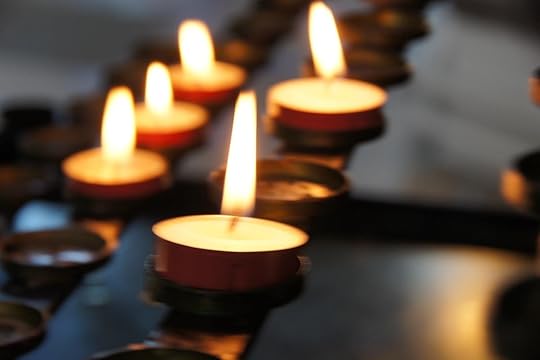 Last week, when a self-proclaimed Christian yelled “I am going to kill all Asians” and then killed 8 people—6 of whom were Asian American women—it was too much.
Last week, when a self-proclaimed Christian yelled “I am going to kill all Asians” and then killed 8 people—6 of whom were Asian American women—it was too much.Just too much.
So in this article, my hope is to help you understand:
That this senseless murder was actually a racist hate crime against AsiansThat Jesus would never endorse or condone such hatredWhat we’re saying to God when we allow our churches to remain mono-ethnicLet’s go in order.
1. This senseless murder was a racist hate crime against AsiansIf you quickly Googled “Atlanta Spa Shootings,” you’ll find a lot of reporting about what happened. And the purpose of my article here isn’t to recap what happened—there’s a lot of other better places for that.
Instead, I want to point out what you may not as easily find:
Less than 24 hours after the shootings, a captain from the county sheriff’s office said about the killer, “Yesterday was a really bad day for him and this is what he did.” That same police officer shared a picture last year of a t-shirt that said, COVID-19 is an “imported virus from CHY-NA.” And in that post, he said “Love my shirt…get yours while they last.” [1]The killer drove past hundreds of other potential “sexual temptations” for 35 miles to target three different spas owned and operated by Asian women. [2]There is a long history of the fetishization of Asian women that traces itself back to wars fought in Vietnam and Korea, as well as the porn industry. [3]Hate crimes against Asian-Americans in major Canadian cities are 600-700% higher than the previous year. [4]Although hate crimes have risen in American cities, the majority of hate crimes never get reported, which skews the actual numbers. [5]One source said “it had received more than 3,700 reports of anti-Asian verbal harassment, civil rights violations and physical assault over the last year.” [6]Although the majority of anti-Asian racist attacks involved verbal harassment, physical aggression, and being coughed at and spat on, what’s troubling is how “children were more likely to be on the receiving end of physical attacks than adults. Children also reported significant mental and emotional trauma in rates that outpaced all other age groups.” [7]If all of that wasn’t enough, here’s what threw me over the edge—an eye witness account in the media heard the killer say, “I’m going to kill all Asians” during the shooting. [8]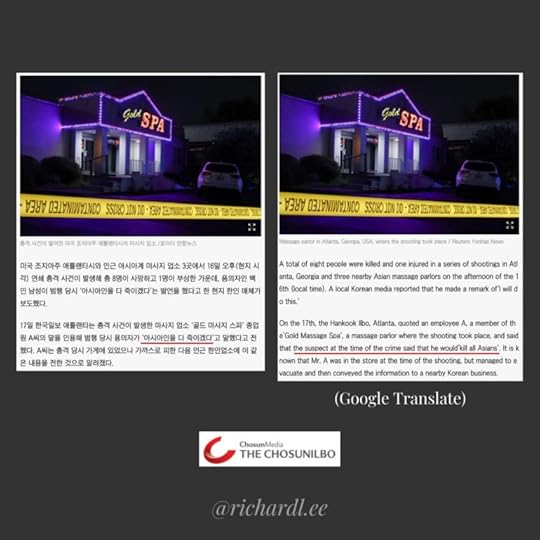
The only reason you haven’t heard this last point is because it was a Korean employee who was interviewed by a local Korean media source and was reporting in the Chosun Ilbo, a national Korean media outlet.
My friend, Richard Lee, who works with International Justice Mission, put it like this,
The only source saying that this was a “sexually motivated crime” is from the suspect after being interviewed by the police. If it is classified as a hate crime, the accused will have added time to his sentence. So, the same person who would suffer the most from a hate crime classification is the only source who denies it was racially motivated.
On the one hand, you have an eye witness, who was shot at and escaped with his life. But his voice is literally not being heard, because he does not speak English. Instead, we take the word of a white man, who just killed 8 people.
Why are we letting the murderer control the narrative? Why aren’t we listening to the voices of the victims? Is it because of their language and accent of their voices?
Friends, this senseless murder was a racist hate crime against Asians. Don’t let the killer and media tell you otherwise.
2. Jesus would never endorse or condone such hatredIt’s been widely reported that the killer claimed to have a sex addiction and wanted to kill these women to “eliminate temptation.” Also, he is apparently a self-proclaimed Christian who “goes to a Southern Baptist church that has been connected with Founders Ministries, now best known for its anti-Critical Race Theory efforts.” [9]
Sigh…
As Christians, although we are called to live a life of purity, and be holy because God is holy (1 Pet 1:16), heinous acts like this have nothing to do with Jesus. As I shared in this OMNI TV National Newscast, sinning by killing people to eradicate or eliminate your temptation to sin has nothing to do with Jesus and nothing to do with Christianity. (If you don’t speak Tagalog, you can skip to 3:11 to hear my response in English)
Sinning by killing people to eradicate or eliminate your temptation to sin has nothing to do with Jesus and nothing to do with Christianity.
Click To Tweet
Also, see here what it says in Proverbs 16:9 CSB, “The LORD hates six things; in fact, seven are detestable to him: arrogant eyes, a lying tongue, hands that shed innocent blood, a heart that plots wicked schemes, feet eager to run to evil, a lying witness who gives false testimony, and one who stirs up trouble among brothers.”
That is the very definition of what has just happened…and we see clearly that God is NOT on his side.
Although this killer claims to be Christian, we know in the Bible that Jesus said to beware of ravaging wolves who dress in sheep’s clothing, pretending to be Christian but who actually aren’t.
We are called to love, not hate. “We love because he first loved us. If anyone says, “I love God,” and yet hates his brother or sister, he is a liar. For the person who does not love his brother or sister whom he has seen cannot love God whom he has not seen. And we have this command from him: The one who loves God must also love his brother and sister.” (1 John 4:19-21 CSB)
We are called to love, not hate.
Click To Tweet
Friends, it’s clear that Jesus would never endorse or condone such hatred.
3. What we’re saying to God when we allow our churches to remain mono-ethnicSeeking first “the kingdom of God and his righteousness” (Matt 6:33) has a future and present aspect to it. For the future, it’s about trusting that God will fully establish his rule and reign over all things when Jesus returns. For the present, it’s about actively praying and being a part of the growth and expansion of his rule and reign everywhere that darkness reigns.
And as we’ve experienced over this past year, one place darkness continues to reign is in the division of humanity—and the church—through racism, which is a systemic evil that’s deeply embedded in our society and culture.
Racism is a systemic evil—deeply embedded in our society and culture—that divides humanity and the church.
Click To Tweet
In the Kingdom of God, when God’s rule and reign is fully established, we know that there will be people “from every nation, tribe, people, and language, which no one could number, standing before the throne and before the Lamb” (Rev 7:9 CSB).
This doesn’t mean that race will go away or that ethnicity doesn’t matter when you become a Christian.
No, not at all! Rather, this means that God has uniquely designed every nation, tribe, people, and language to reflect a different aspect about Himself. So we need to celebrate and learn from every race and ethnic group, so that we can know and worship God deeper and more fully.
We need to celebrate and learn from every race and ethnic group, so that we can know and worship God deeper and more fully.
Click To Tweet
Now when someone who claims to be a Christian kills eight people because he was “addicted to sex” and wanted to “eliminate temptation,” we need to pay attention to what we are teaching and discipling the church about sex and temptation. And when six of the eight people are Asian American woman, and he yells “I’m going to kill all Asians” during the shootings, we need to pay attention to what we are teaching and discipling the church about the Kingdom of God.
We need to pay attention to what we are teaching and discipling the church about sex, temptation, and the Kingdom of God.
Click To Tweet
This is what happened in Atlanta last week.
We live in a society and culture that’s racist and has an imbalance of power. And the reason this seeps into the church is because of a lack of understanding about the Kingdom of God. If someone claims to be Christian and hates a particular “nation, tribe, people, or language,” they are essentially saying that they hate a part of God and want to fix God’s perfect vision for humanity. And if someone who claims to be Christian is driven more by hate than love, there needs to be an inner awakening because Scripture is clear about us being people of love, not hate.
We live in a society and culture that’s racist and has an imbalance of power. And the reason this seeps into the church is because of a lack of understanding about the Kingdom of God.
Click To Tweet
Let me quote 1 John 4:19-21 again, “We love because he first loved us. If anyone says, “I love God,” and yet hates his brother or sister, he is a liar. For the person who does not love his brother or sister whom he has seen cannot love God whom he has not seen. And we have this command from him: The one who loves God must also love his brother and sister.” (1 John 4:19-21 CSB)
Friends, please allow a vision of the Kingdom of God to shape how you talk about race, power, and the future of your church.
Come Lord Jesus come.
A vision of the Kingdom of God must shape how we talk about race, power, and the future of the church.
Click To Tweet
Footnotes:
[1] https://globalnews.ca/news/7704008/atlanta-spa-shootings-bad-day-racism/
[2] https://www.bbc.com/news/world-us-canada-56433181
[3] https://www.cnn.com/2021/03/17/us/asian-women-misogyny-spa-shootings-trnd/index.html
[4] https://www.ctvnews.ca/canada/reports-of-anti-asian-hate-crimes-are-surging-in-canada-during-the-covid-19-pandemic-1.5351481
[5] https://www.theguardian.com/us-news/2021/mar/18/fbi-pressure-anti-asian-hate-crime-atlanta
[6] https://www.washingtonpost.com/technology/2021/03/17/anti-asian-attacks-shootings/
[7] https://www.ctvnews.ca/health/coronavirus/new-report-details-disturbing-rise-in-anti-asian-hate-crimes-in-canada-1.5358955
[8] https://www.chosun.com/international/us/2021/03/17/XSDXYLMAQZCC5JWMQ4HGRZGOG4/
[9] https://www.christianitytoday.com/edstetzer/2021/march/religion-race-and-atlanta-murders-untangling-multiple-layer.html

March 9, 2021
My Interview on 100 Huntley Street
I was honoured to be interviewed today by Lara Watson on Canada’s longest running daily TV show, and the sixth longest running daily TV show in the world, 100 Huntley Street.
I pray that today’s episode encourages you by helping you identify any lies you might have mistakenly come to believe about yourself.
You can watch the episode here:
If you would like to learn more about my book, You Are What You Do: And Six Other Lies about Work, Life, and Love that Lara interviewed me on in today’s episode, click here.
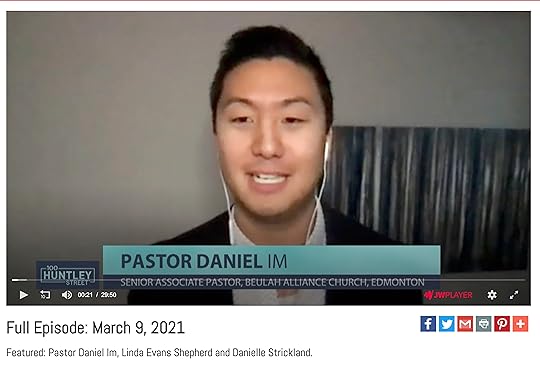

March 2, 2021
Why You Might Be Feeling Busy
 Are you busy?
Are you busy?I’m not asking whether or not your calendar or plate is “full.” I’m asking whether you feel busy, rushed, or hurried deep within?
One researcher discovered that many Christians fall into a vicious cycle of busyness that leads to distraction from God:
“Christians are assimilating a culture of busyness, hurry and overload, which leads to…God becoming more marginalized in Christians’ lives, which leads to…A deteriorating relationship with God, which leads to…Christians becoming even more vulnerable to adopting secular assumptions about how to live, which leads to…More conformity to a culture of busyness, hurry and overload. And then the cycle begins again.” [1]This year, I want to challenge you to actively resist that.That impulse inside of you, which makes you believe you are what you do. That whisper inside your head, which causes you to think your worth comes from your output. And that voice from our culture, which glorifies the busy and vilifies the idle.
That. That thing. That impulse. That whisper. That voice. In 2021, let’s together resist THAT.
I love how Ruth Haley Barton puts it in her book, Strengthening the Soul of Your Leadership,
The path to resisting that, is not found in holidays, vacations, or getting away.When we keep pushing forward without taking adequate time for rest and replenishment, our way of life may seem heroic, but there is a frenetic quality to our work that lacks true effectiveness because we have lost the ability to be present to God, to be present to other people and to discern what is really needed in our situation. The result can be “sloppy desperation”: a mental and spiritual lethargy that prevents the quality of presence that would deliver true insight and spiritual leadership…When we are rested, however, we bring steady, alert attention that is characterized by true discernment about what is truly needed in our situation, and the energy and creativity to carry it out.[2]
Freedom from busyness is not found in holidays, vacations, or getting away.
Click To Tweet
The path to resistance is the Sabbath—one day a week where we are not doing what we have to do, but a day where we get to be. It’s a day to rest, a day to rejoice, and a day to worship.
The Sabbath is that day—once a week—where we are reminded that we are not human doings, but human beings, and that God is God, not us.
The Sabbath is that day where we remember that God did not rest on the seventh day because He was tired, but because He knew how much we needed it. And heck, if HE RESTED, what excuse do we have not to?
The path to resistance is the Sabbath—one day a week where we are not doing what we have to do, but a day where we get to be.
Click To Tweet
I love how Mark Buchanan describes the Sabbath in his book, The Rest of God: Restoring Your Soul by Restoring the Sabbath,
Sabbath is that one day. It is a reprieve from what you ought to do, even though the list of oughts is infinitely long and never done. Oughts are tyrants, noisy and surly, chronically dissatisfied. Sabbath is the day you trade places with them: they go in the salt mine, and you go out dancing. It’s the one day when the only thing you must do is to not do the things you must. You are given permission— issued a command, to be blunt—to turn your back on all those oughts. You get to willfully ignore the many niggling things your existence genuinely depends on—and is often hobbled beneath—so that you can turn to whatever you’ve put off and pushed away for lack of time, lack of room, lack of breath. You get to shuck the have-tos and lay hold of the get-tos.[3]
Wow. Sabbath is that day once a week where we get to “shuck the have-tos and lay hold of the get-tos.” I love that.
Sabbath is that day once a week where we get to ‘shuck the have-tos and lay hold of the get-tos.’
Click To Tweet
Did you catch that? You can’t just add the Sabbath onto your proverbial list of to-dos. If you take that approach, the Sabbath will feel more like a burden than a blessing.
Practicing the Sabbath is a re-orientation to life, a re-orientation to ministry, a re-orientation to priorities, and a re-orientation to grocery shopping, vacuuming, and all the other “have-tos” of life. We must edit the other six days before we can start practicing the Sabbath.
We must edit the other six days before we can start practicing the Sabbath.
Click To Tweet
So this year, what do you need to move to the other six days, so that you can observe the Sabbath?
I’ll leave you with a few words from Ruth Haley Barton on this matter,
Let’s ensure that this is the year we have a weekly rhythm of being still and knowing that He is God by practicing the Sabbath.
Sabbath keeping is the linchpin of a life lived in sync with the rhythms that God himself built into our world, and yet it is the discipline that seems hardest for us to live. Sabbath keeping honors the body’s need for rest, the spirit’s need for replenishment and the soul’s need to delight itself in God for God’s own sake. It begins with the willingness to acknowledge the limits of our humanness and then to take steps to live more graciously within the order of things.
And the first order of things is that we are creatures and God is the Creator. God is the one who is infinite; I, on the other hand, must learn to live within the physical limits of time and space and the human limits of my own strength and energy. There are limits to my relational, emotional, mental and spiritual capacities. I am not God. God is the only one who can be all things to all people. God is the only one who can be two places at once. God is the one who never sleeps. I am not. We can’t remind ourselves of this enough. This is pretty basic stuff, but many of us live as though we don’t know it.[4]
*My article here was originally published on January 27, 2021 on Impactus.
[1] Ruth Haley Barton, Strengthening the Soul of Your Leadership, 118.
[2] Ruth Haley Barton, Strengthening the Soul of Your Leadership, 120.
[3] Mark Buchanan, The Rest of God, Location 1443.
[4] Ruth Haley Barton, Strengthening the Soul of Your Leadership, 122.

January 27, 2021
Before Changing Things In Your Church, Read This First!
Okay, maybe not everything, but doesn’t it sort of seem like everything’s different?
Sure, there are the in-your-face differences like masks, social distancing, online school, and the run-for-the-mountain reflex when someone sneezes, but more than all of that, I find it’s the subtle differences that scare me the most. Things like that subtle anxiety when someone gets too close or the crowd is too large, or that subtle knot in your stomach when you wonder whether your church auditorium will ever be full again. Subtle things like that…
Now at some point in the future, I’m quite certain the in-your-face differences will come to an end and life will return to some semblance of normal, but what about those subtle differences…?
We’re in the middle of some permanent changes to the way we feel, think, and live.Culture post-COVID is not going to be the same as culture pre-COVID, so what can we do today, since we’re in the middle of it all?
What can we do today to better prepare ourselves to reach our neighbourhoods and cities tomorrow, once COVID is a thing of the past? Especially if you’re a church leader?
What can we do today to better prepare ourselves to reach our neighbourhoods and cities tomorrow, once COVID is a thing of the past? Especially if you’re a church leader?
Click To Tweet
Yes, it certainly is. But where to start?
In my book, No Silver Bullets: Five Small Shifts that will Transform Your Ministry, I talk about change this way:
Any change you try to implement in your church has one of three fates. 1) It’ll never get off the ground because it will be seen as a bacteria, virus, or foreign matter and subsequently be rejected. 2) The change will happen, but because it doesn’t fit into your vision, strategy, and values, you will inevitably end up changing things again. 3) The change will move you closer to the vision, strategy, and values that God has called you to embrace because you started with discernment by using the three steps for introducing change.
Here’s where most church leaders get things wrong.
We get so excited about the change—or some program that we’ve seen work elsewhere—that we completely forget that we’re introducing this change into a living, breathing, organism (the church) made up of living, breathing, organisms (people).
What I don’t want to do is tell you what you need to change, or even give you a few suggestions on things to change. Instead, I want to advise you to pause, take a step back, and assess what kind of culture your church currently has: Are you a Copy Cat Church, Silver Bullet Church, Hippie Church, or an Intentional Church?
Once you figure this out, your path forward will be abundantly clear.
Pause, take a step back, and assess what kind of culture your church currently has.
Click To Tweet
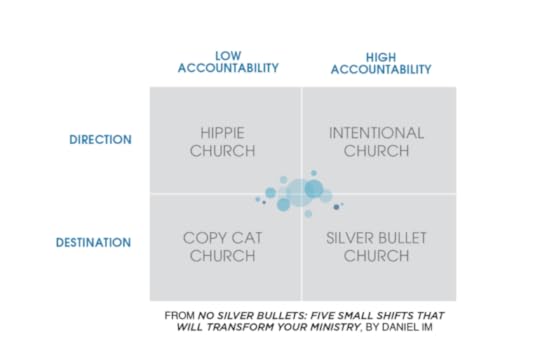
In the first chapter of No Silver Bullets, I’ve included a full explanation of the Influences Matrix (above diagram), and also a few assessments that will help you discern where your church is at, so that you can figure out where you need to go.
Instead of trying to copy and paste all of that into this post, I thought it’d be better just to give you all of that for free. So if you click here, you can download the first chapter for free to discern where you’re at and what needs to change as we adjust to our new post-COVID reality of life.
Friends, don’t waste this pandemic.Please see it as an opportunity to be a student of your church, so that you can prayerfully discern what needs to change moving forward, in order for your church to be a sign, instrument, and foretaste of the kingdom of God in your neighbourhood, town, or city.
Don’t change things until you first start here.
Don’t waste this pandemic. Please see it as an opportunity to be a student of your church.
Click To Tweet

January 11, 2021
The Role of Mentors in Healthy Leadership Succession
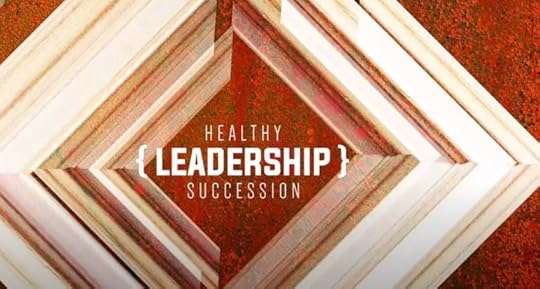 Two years ago, Christina and I started our journey back to Edmonton by first praying and seeking God’s face for His will and His ways.
Two years ago, Christina and I started our journey back to Edmonton by first praying and seeking God’s face for His will and His ways.In addition to saturating this entire process in prayer, we also sought the counsel of others who had gone before us in making similar transitions. After all, it says in Proverbs 15:22, “Plans fail when there is no counsel, but with many advisers they succeed.”
While this might seem like I’m just name dropping, I want to take the time to publicly acknowledge and thank those who have invested in us through prayer and wise biblical counsel, as we sought God’s will and ways to enter into this succession process at Beulah Alliance Church.
I know I’m going to miss some people, so I apologize in advance, but a huge thank you to Todd Adkins, Ed Stetzer, Eric Geiger, Kevin Peck, Josh Patterson, Kevin Queen, TJ Tims, Chris Freeland, Ron Edmondson, Matt Boda, Brent Trask, Phil Kniesel, Sean Morgan, Carey Nieuwhof, Bill Willits, Gregg Matte, and Brent Dolfo.
This past year in particular though, Dave Stone has been instrumental in my life.As a humble and godly leader who has been on both ends of healthy succession, I couldn’t think of a better pastor to mentor me and guide our church and leadership through this process. At Southeast Christian Church, he followed Bob Russell, a 40 year founding pastor, then, after 13 years, he passed the leadership baton to Kyle Idleman.
As I’ve been preparing to step into this Lead Pastor role, Dave has been a deep well of wisdom who has been walking with us closely. One of the things that he graciously agreed to do was to speak to our broader church family to help us understand what healthy leadership succession looks like.
Here’s his message:Thank you for praying for Christina and me, and our broader church family as we continue this succession process over the next few months.

December 31, 2020
2020 in a Single Word = ________

What word would you use to sum up 2020?
When you’re sitting down with your not-yet-born children, grandchildren, or great grandchildren, what are you going to say about 2020? And when you read through the not-yet-written history books outlining the COVID-19/coronavirus global pandemic of 2020, what lens will you be looking through? What word will you be searching for?
Unprecedented?
Interruption?
Change?
Pivot?
In 2020, according to Google, the phrase “Why?” was searched more than ever before:
Why is the NBA postponed?Why is Parasite so good?Why am I so tired?Why are schools closed?Why is toilet paper sold out?Why is March so long?Why is Australia burning?Why is the sky orange?Why are so many people dying?Why is empathy important?Why are people protesting?Why do black lives matter?Why are we not defeated?Why is the election so divisive?Why is democracy important?Why do people dream?
For me, the word of 2020 is LOSS.
This past year was a year of loss.
2020 was filled with more loss than anyone should ever experience—not just in a year, but in a lifetime:
The loss of lifeThe loss of healthThe loss of jobsThe loss of financesThe loss of stabilityThe loss of normalThe loss of in-personThe loss of touchThe loss of trust…and for many the loss of hope
Underneath the surface of the earth, there are cracks (or fault lines) everywhere.
Although they’re not necessarily visible to the eye, they are there. And it’s only when there’s an earthquake, that we realize what’s been there all along underneath the surface—the cracks.
Well, for many, 2020 was the year where we came face to face with the cracks in our lives.
2020 was the year where we came face to face with the cracks in our lives.
Click To Tweet
The “earthquake” of this global pandemic, its shutdowns, and its ensuing effects revealed what was already there underneath the surface all along—the cracks:
The cracks in your marriageThe cracks in the way you deal with stressThe cracks in your family relationshipsThe cracks at workThe cracks in your financesThe cracks in your faith…and the cracks in your identity
Everything that you used to place your identity in—when things were “normal”—was shaken, tested, and (for some) stripped away this past year:
If you lost your job and felt unrooted, it’s because you believe the lie that “you are what you do”If your vacation plans were interrupted and you threw yourself a pity party, it’s because you believe the lie that “you are what you experience”If the loss of in-person gatherings with friends, at work, with family, at church, or wherever else for that matter, sunk you into a deep hole of depression, it’s because you believe the lie that “you are who you know”If you were incessantly searching for COVID-19 stats, obsessing over the news, or found yourself chasing after any one of the countless number of conspiracy theories from this past year, it’s because you believe the lie that “you are what you know”If you were hoarding toilet paper, or found yourself shopping on Amazon way more than you usually do, it’s because you believe the lie that “you are what you own”If you were humble bragging over your ability to simultaneously teach your children and work at home, or refused to post anything because your kids were on electronics all day long, it’s because you believe the lie that “you are who you raise”If you were, and are still, trying your darnedest to get back to the way things used to be before COVID-19 because life was better back then, it’s because you believe the lie that “you are your past”
Friends, none of this is supposed to shame you or give you a guilt trip…
…but if you found yourself nodding to any of the previous bullet points (like me) it’s because 2020 merely revealed the cracks that were already there underneath the surface.
Everything that you used to place your identity in—when things were “normal”—was shaken, tested, and (for some) stripped away this past year.
Click To Tweet
The point of this article is to simply help you uncover what is, so that you can move forward in 2021 to what will be:
A life that is not characterized by the loss that comes when we live bound to the chains of these lies, but a life that is free and full when we replace these lies with the truth of who we really are.
So in 2021, I want to invite you into a journey of discovering which of these seven lies you’ve lived according to and how to lay them down by reading my book, You Are What You Do: And Six Other Lies About Work, Life, and Love. In my book, I carefully unpack the many ways we often believe each of these seven lies, the unintended consequences when we live according to them, and how to break free from them.
Let’s together choose a life of resistance.
The kind of resistance that opts for love over hate, light over darkness, forgiveness over shame, and generosity over greed.
The kind of resistance that uncovers who we aren’t, so that we can begin the journey of discovering who we really are.
And the kind of resistance that begins with the truth that you are not what you do, you are not what you experience, you are not who you know, you are not what you know, you are not what you own, you are not who you raise, and you are not your past.
I will choose a life of resistance. The kind of resistance that opts for love over hate, light over darkness, forgiveness over shame, and generosity over greed.
Click To Tweet
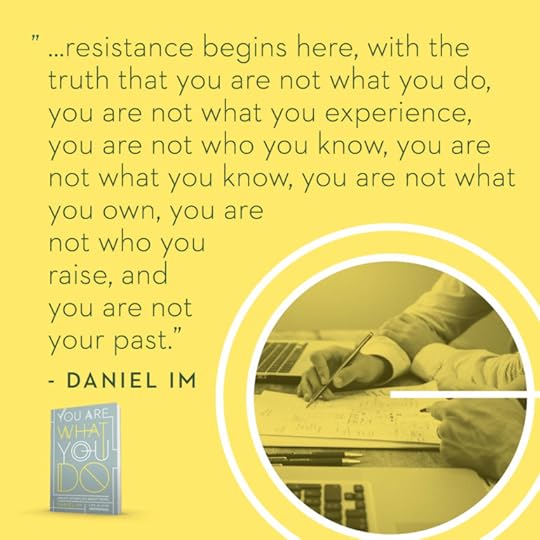

December 9, 2020
The Gift of Reading

This Christmas, what would it look like if you gave the gift of reading?
Through a few of my favorite quotes, here’s why a book sometimes makes the best gift:
“Today a reader, tomorrow a leader.” – Margaret Fuller
Click To Tweet
“Reading maketh a full man; speaking, a ready man, writing, an exact man.” – Francis Bacon
Click To Tweet
“Show me a family of readers, and I will show you the people who move the world.” – Napoleon
Click To Tweet
“If a man is known by the company he keeps, so also his character is reflected in the books he reads.” – Oswald Sanders
Click To Tweet
“Writing and reading decrease our sense of isolation. They deepen and widen and expand our sense of life: They feed the soul.” – Anne Lamott
Click To Tweet
To make it easy for you, I wanted to share a few of my favourite books from this past year, who you could possibly give them to, and why:
1. Stop Taking Sides by Adam Mabry
This book is for the person in your life who sees everything as black and white. It’s for the person who struggles with the tension of living and being in the middle. This book is an incredibly insightful treatise on today’s biblical and cultural tensions.
2. The Way of the Dragon or the Way of the Lamb: Searching for Jesus’ Path of Power in a Church that Has Abandoned It by Jamin Goggin and Kyle Strobel
If you know a pastor or a leader who has been troubled by the recent implosion of other pastors and leaders, this book is for them. It’s simultaneously insightful, timely, and a good wake up call for anyone in leadership
3. Future Church: Seven Laws of Real Church Growth by Will Mancini and Cory Hartman
This is for all of your pastor friends. Post-quarantine and post-pandemic, this book will give the pastors in your life insight into the future of the church.
4. BLESS: 5 Everyday Ways to Love Your Neighbor and Change the World by Dave and Jon Ferguson
If you are wondering how to love your neighbours and easily share the love of Jesus with them, look no further. There is no simpler way to normalize the Great Commission and sharing the gospel than B.L.E.S.S..
5. You Are What You Do: And Six Other Lies about Work, Life, and Love by Daniel Im
I know this might seem like a selfish plug, but I really do believe that my newest book has an incredibly timely message for today. This book is for the mom who’s rediscovering herself as her children are growing older. For the dad who’s wrestling through the tension of being present for his children, while also trying to make ends meet and provide for his family. For the student who is not convinced that a traditional nine-to-five job is right for them. For the individual who wants clarity around their purpose and identity, since there’s such cultural confusion about who we are and where our worth comes from. And for anyone and everyone who is tired of the hustle, grind and go of life and wants to experience something different.
What book would you add to the list?



